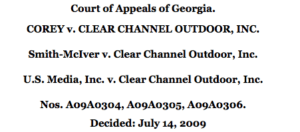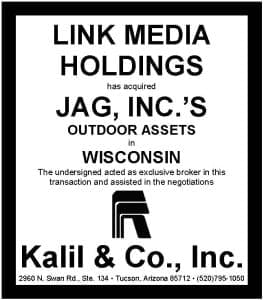 It’s common for a buyer of outdoor advertising assets to ask a seller not to compete in the outdoor advertising business within a geographic area related to those assets. Usually a portion of the purchase price is allocated to the non-compete. Corey v Clear Channel Outdoor shows how expensive if is to violate a non-compete.
It’s common for a buyer of outdoor advertising assets to ask a seller not to compete in the outdoor advertising business within a geographic area related to those assets. Usually a portion of the purchase price is allocated to the non-compete. Corey v Clear Channel Outdoor shows how expensive if is to violate a non-compete.
- In December 1997 Corey Outdoor agreed to sell a billboard plant in Atlanta to Clear Channel Outdoor for $43.7 million. The sale included a non-compete clause, valued at $2 million, in which Corey agreed not to compete directly or indirectly with Clear Channel’s Atlanta billboard business for two years and not to interfere with Clear Channel’s outdoor advertising properties for five years.
- Just before the sale was completed in March 1998 Corey’s in-house counsel formed a new company called U.S. Media. Diane Smith-McIvor was the company’s titular head. A forensic accountant brought in during subsequent litigation found that Smith-McIvor did not own or run the company. The accountant testified that Corey funded US Media with money from the Clear Channel sale and ran the business from Corey’s offices using Corey employees.
- US Media bought 9 billboards in Atlanta over the next two years. Smith-McIvor transferred the company to Corey in January 2001 for $25,000.
- In 2002 Clear Channel Outdoor sued Corey, US Media and Smith-McIvor for fraud and breach of non-compete.
- A trial court awarded Clear Channel $4 million consisting of damages of $2 million, $1.38 million of pre-judgement interest and $1.5 million in attorney fees. An appeals court upheld the decision.
Insider’s take: It’s very expensive to violate a non-compete.
Paid Ad

















